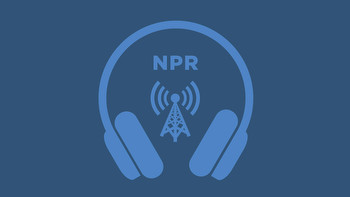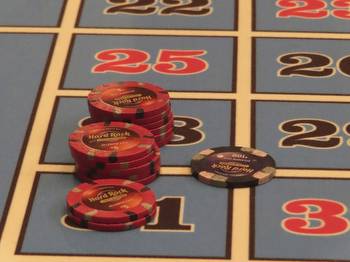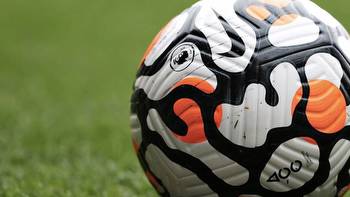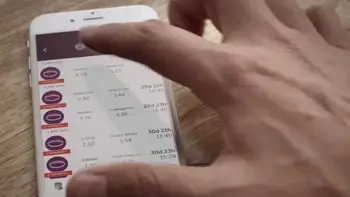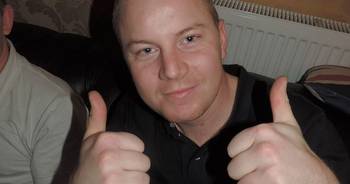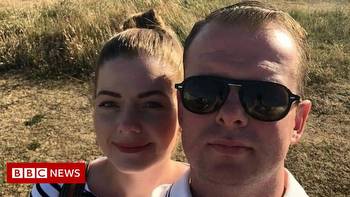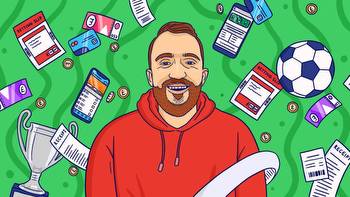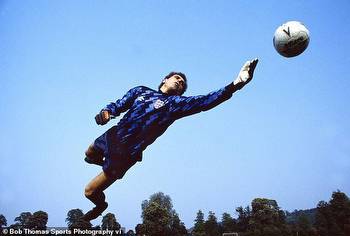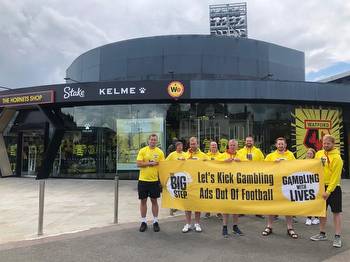I hid my £50k+ gambling debt from my wife'
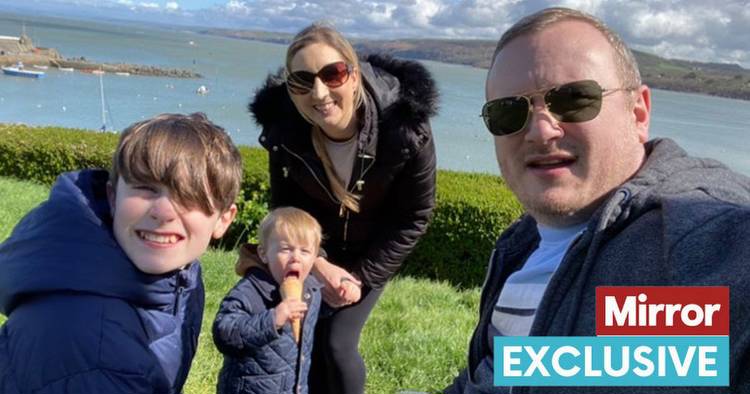
It wasn’t so much about the winning for former gambling addict Ben Melvin, it was the thrill of taking part.
Instead of giving his complete focus to a football game, he would be clutching his phone in his hand, secretly stalking the screen for the next notification on his latest bet.
The pop-ups fuelled a habit that started at the age of 14 with fruit machines at his local leisure complex, and went on to see him spiral into more than £50,000 of debt and lie to his wife and family.
“Seeing the flash on my phone would give me a buzz, not watching the game or watching a roulette wheel, but just at remembering what bet you’ve put on,” Ben recalls - looking back at the height of his addiction betting on football matches via mobile phone apps - amid his petition calling to remove gambling advertisement from his club Everton FC.
“‘Will it come? Will it come?’ - it’s the excitement of looking at it going off again.
“People I was with would say ‘what’s that?’ and I would just make something up.
“Inside, I’m getting this kick. It doesn't matter if I won or lost, I’d be straight back on it.
“The more I won, the more I bet. And the more I lost, the more I had to try and recover the costs.
“It was a never-ending cycle of having to do it more and more while the addiction took over.”
While he didn’t realise it at the time, Ben, 35, believes his addiction began twenty years ago.
As a teen, he would spend weekends with his friends at a popular entertainment complex in his hometown of Great Sutton, Ellesmere Port, in the North West.
Although typical arcade games were housed there, such as racing and shooting games, Ben was instead drawn to the fruit slot machines for 10p a play.
Having worked all his life, from the age of 14 he poured his pocket money from pot washing at his local pub into the machines, and if his parents questioned it, he said he’d spent his pennies on bowling and sweets.
“Even though signs said you had to be over 18, it wasn’t controlled,” Ben tells The Mirror.
“We’d spend all day there.
“The other games didn’t give me the same amount of buzz or thrill as these fruit machines. It was only them I would ever play.
“I thought it was normal - no one said to be careful about losing my money and you couldn’t put enough in them to lose.
“Any money I earnt would enable me to gamble on those machines.”
The enjoyment of gambling soon turned sour by his mid-twenties following the introduction of online games and apps that he could download on his phone in seconds.
The casino was brought to his home, and he could even play on the go out and about.
As a football fanatic, he began betting on leagues all around the world at different times of the day - some teams he hadn't even heard of before.
“That’s when it started to become a problem,” Ben, a father-of-two and process operator for the petrochemical industry, says.
“My gambling was always an addiction, when I look back I can see I've always been attracted to not the win or loss, but taking part in some sort of gamble.
“When I was introduced to phone gaming, it just became so easy with card details.
“I only wanted to spend my time online gambling and needed to make free time to play. I was pressing a button constantly on my phone so I couldn’t do that in the vicinity of people I knew - I couldn't allow that to happen.”
Ben has been with his wife Kelly, 34, since he was 19. They bought their first home together when he was 20 and welcomed their first child together, Ollie - now 12 - when Ben was 23.
Nursery worker Kelly knew he’d always liked to bet, he says, but she never caught on to the severity of his addiction.
Ben would handle all of their finances as an insurance policy to keep Kelly from ever finding out how much he was splurging.
He never let on that they were in financial difficulty, and if Kelly wanted a new dress, for example, he’d borrow from elsewhere so she didn’t suspect anything.
“One of the hardest things of a gambling addiction is that it’s very hidden,” Ben explains.
“I needed money and needed to be in control of it.
“Important bills would be paid, but every other penny was my gambling money - I became obsessed.
“There was never spare money for holidays because, in my eyes, that would be wasted money - anything not spent on gambling was a waste.”
Ben took out credit cards, loans, and overdrafts - and would transfer money between accounts frequently to try to balance the books.
Between the ages of 25 and 30, Ben would spend thousands a month on gambling.
The most he’d ever won from a bet in one go was £14,500, but it was never enough to keep up with how much he owed.
While it’s hard for him to put a figure on how much he has lost over the years, when Ben hit rock bottom, he owed a total of £50,000.
He’d maxed out the credit cards, overdrafts were at their limit, and he had taken out a number of pay-pay loans.
At the point at which he admitted everything to Kelly, 15 lenders were all asking for their money.
“It was just too much,” Ben says about his breaking point.
“It wasn’t just the pressure of money, which was the biggest worry, but I would worry constantly that a loan provider would turn up at the door or about a letter coming through the door.
"My phone would be kept on silent. I blocked the numbers asking me for payments.”
Ben continued: “My mental health went through a right state - it was the lies, the deceit. I couldn’t remember what I’d said to people and I used to make notes on my phone of who I owed money.
“The only hope at that point is that I would win enough but really, I was never going to, it would repay some but it would end up being more gambling money."
He adds: "I can’t put a figure on the amount I’ve lost over the period - it would be astronomical.”
Ben finally came clean to Kelly and his family when he couldn’t see a way out and considered taking his own life.
He felt overwhelmed with guilt over the harm he believed he had brought to his family and couldn't recognise himself.
“My wife, my son, my mum and dad, I would never do anything to harm these people but when addiction takes hold, nothing else in the world matters apart from me being able to bet,” Ben admits, who became a father for the second time at the age of 32.
“When my oldest son Ollie was a baby I should have been a dad and did normal things like taking him to the park - all of that was sacrificed.
“All my time was spent on my phone or laptop.
“If the kid needed picking up from school, that did not matter.
“I was unreliable, not a good husband or friend, I wasn’t a nice person.
“It wasn’t who my wife married, I became someone else.
“I destroyed people’s lives along the way... you take everyone else with you.”
Despite being sceptical at first and struggling with denial about his addiction, Ben joined Gambling Anonymous with the support of his family.
He still attends the addiction support group every Wednesday - and says it saved his life.
Speaking to people who understood what he was going through allowed him to overcome the turmoil of guilt.
But his journey to recovery hasn't been an easy path, with a number of relapses on the way.
However Ben placed his last bet two-and-a-half years ago on December 6, 2019.
Now on the other side, he regrets 'wasting' his life, he says, with no hobbies and having missed out on life’s simple pleasures.
“I had many relapses because it was difficult to comprehend that you can never ever gamble again, it was the only thing I’d ever done,” Ben says.
“To go from doing it every single day to not, it was frustrating and a major lifestyle change. I didn't know anything else.
“But I thought ‘what have I been doing?’"
Ben, who now spends quality time with his family, says he is clued up on how the gambling games work to hook people in and has put blocks in place to stop him from gambling ever again, such as not having online banking.
Kelly is also now in charge of the family's finances.
“I don’t have an urge anymore, the urge is minimal,” he says.
“I’m too wise for it all now though, I can see straight through them.
“We work hard to provide for our two sons. I can't replace the time with Ollie but he’s got a better version of me now than he ever had.
"It’s nice to see they’re happy.”
On why he thinks he became addicted while his friends, who still do the odd bet didn’t, Ben says: “It’s a question that will bug me 'til the day I die.”
He hopes to educate others on the dangers of gambling and is calling on his football team, Everton FC, to remove their partnership with online gambling firm Stake.com.
The agreement, which will net Everton in excess of £10 million per season , replaced the club's sponsorship deal with Cazoo from July 1.
Ben, who has set up a petition calling on the government to act with almost 31,000 signatures, says his footy club is known as ‘the people’s club’ and is praised for their work off the pitch in helping the local community - but this is a "kick in the teeth".
The partnership sees Stake branding on the kit as well as appearing on screens and media backdrops at Goodison Park, Finch Farm and across the club’s digital platforms.
"Children and young supporters will be bombarded with the Stake.com brand every time they watch their favourite team play," Ben argues.
"The advertisement of such a harmful product to children is dangerous and irresponsible.
"Football is massively dominated by gambling advertisement, why is it normalised?
"Why are we being targeted?"
Ben continued: "It got to the point where I couldn’t watch football without putting a bet on it as I didn’t see the point.
"The love of the game gets replaced by the love of the bet.
"I wouldn’t wish what I went through, the devastation my family and friends experienced, and what other young people are in danger of, on anyone.
"Gambling harms millions of people in the UK and takes hundreds of lives every year, leaving broken and bereaved families behind.
"There are already 55,000 children addicted to gambling in this country and the impact is felt disproportionately amongst more deprived areas - such as the one our club represents.
"The advertisement of such a dangerously addictive product increases the risk of this figure going higher."
The multi-year partnership with the leading casino and sports betting platform is the highest value front-of-shirt deal in the club’s 144-year history.
At the time of the announcement, Professor Denise Barrett-Baxendale, chief executive at Everton, said: “Stake.com is an ambitious organisation with impressive growth plans and we’re all very excited to enter into a partnership with them at this stage in their journey."
A spokesperson for Gambling with Lives - a community of families bereaved by gambling-related suicide that provides support and raises awareness of gambling disorders - warns about the prevalence of gambling advertisements in football compared to other sports.
"Hundreds of people are driven to take their own life each year because of gambling, and nowhere else is gambling’s pernicious and insidious presence felt more than in football," the spokesperson said.
"Despite what gambling industry lobbyists say, gambling advertising works. Why else would they spend so much money on it?
"It’s no coincidence that gambling has saturated football (one study found 700 gambling adverts appeared during a single televised Premier League match), which is incredibly popular with young men – the cohort most likely to get addicted to gambling.
"Football is often the ‘hook’ that draws young, first-time gamblers in, who then go on to get cross-sold highly addictive casino games, often setting them up for a lifetime of addiction."
Ben's petition comes with the publication of the government’s long-awaited Gambling Act review White Paper due imminently, which will set out the government’s proposals for gambling reform.
A spokesperson for the Department for Digital, Culture, Media & Sport said: “We are undertaking the most comprehensive review of gambling laws in 15 years to ensure they are fit for the digital age.
“We will be publishing a White Paper as part of a review of gambling legislation in the coming weeks.”
James Grimes, formerly addicted to gambling and founder of The Big Step campaign - a campaign to end all gambling advertising and sponsorship in football - said: “This is the government’s last chance to get the whitepaper right.
"Bereaved families and those of us harmed by gambling are demanding the government make changes that will save lives and prevent more people from going through what we have had to endure.
“The government must end all gambling advertising in football, not just the Premier League and not just on shirts.”
Everton FC and Stake.com have been approached for comment by the Mirror regarding Ben’s petition.
If you are concerned about a gambling addiction, you can seek support with GamCare - which offers free information, support and counselling for problem gamblers in the UK. It runs the National Gambling Helpline (0808 8020 133) and also offers face-to-face counselling.
Gamblers Anonymous UK runs local support groups that use the same 12-step approach to recovery from addiction as Alcoholics Anonymous. There are also GamAnon support groups for friends and family.









